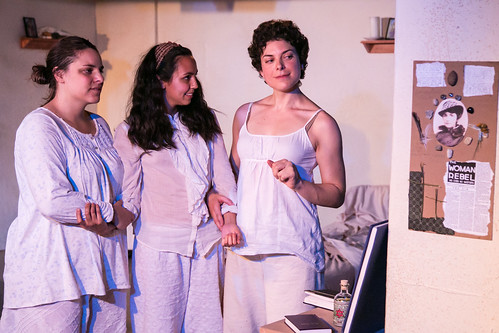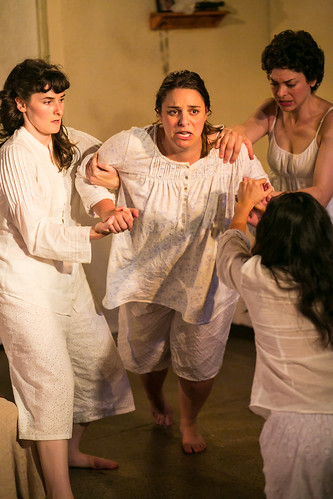What you should know about Impact’s What Every Girl Should Know
The cast of Impact Theatre's What Every Girl Should Know, set in a Catholic reformatory circa 1914, includes, from left Abigail Edber as Anne, Arisa Bega as Lucy and Carlye Pollack as Theresa. Below: Edber is restrained by (from left) Elissa Beth Stebbins, Pollack and Bega. Photos by Cheshire Isaacs
The first thing to know about Impact Theatre's What Every Girl Should Know, a one-act play by Monica Byrne, is that it's a gripping play about matters physical and spiritual. It's also very well produced by director Tracy Ward and an excellent cast of four. This is a play set in 1914 but feels, rather sadly, of the moment because, it seems, there will always be people (old, white men mostly) who want to keep other people (women, mostly) as ignorant as possible, especially when it comes to their own bodies and – heavens forfend – sex.
Byrne's drama is set in the tight confines of Room 14, a four-bed dorm room at St. Mary's, a Catholic girl's reformatory on New York's Lower East Side. The year is 1914, and the church is the ultimate power for the occupants of Room 14: innocent Lucy (Arisa Bega), Anne (Abigail Edber) and Theresa (Carlye Pollack). These young women are not exactly prisoners, but their lives are circumscribed by formal prayers, church services and work in the laundry. Their room, where their confirmation saints sit in framed portraits on a shelf over their beds, is their haven. We know this early on when we meet the girls. Before we see them, there is darkness and the sounds of moaning and creaking bed springs. These women happily engage in the sport of pillow humping and then giddily log their exploits in a book they keep hidden in the rafters. Poor Lucy can't quite get the hang of it the way Anne and Theresa have, but she tries.
The empty bed that once belonged to a recently deceased roommate is soon filled by Joan (Elissa Beth Stebbins), whose uptight nature is a stark contrast to the more relaxed and playful aspect of her new roommates. But Joan isn't so rigid that she won't engage in an ice-breaking game of Truth or Dare.
While Byrne's play seems conventional in nature, it soon breaks out of its familiar shell to embrace a level of emotional exuberance that can only be expressed in dances created by Erica Chong Shuch. The first of these thrilling moments involves the former roommate's death and the next takes the play to whole different level as the women embark on a self-made spirituality inspired by Margaret Sanger, the activist who devoted her life to making birth control available to all and whose work led to the formation of what we now know as Planned Parenthood.
Here's a glimpse into Sanger's work, from her pamphlet that gives Byrne's play its name:
Every girl should first understand herself: she should know her anatomy, including sex anatomy: she should know the epochs of a normal woman's life, and the unfoldment which each epoch brings: she should know the effect the emotions have on her acts, and finally she should know the fullness and richness of life when crowned by the flower of motherhood.
Sanger becomes the patron saint of the women in Room 14, and it's fascinating to watch what begins as sort of a lark deepen into something truly spiritual and meaningful to this four-person congregation. The same is true for the other games the girls play, including a game of pretend that allows them to roam the globe and assassinate those who have wronged them. Here, too, the act of pretending ends up reflecting more reality than fantasy. And though Lucy, Anne, Theresa and Joan are exploring their sexuality and spirituality in the safe and supportive confines of their room, the real world outside those walls, where spirituality is a means of suppression and sexuality too often involves violence and ignorance, intrudes in harsh and, alas, not surprising ways.
Bega, Edber, Pollack and especially Stebbins give powerful performances that only grow in intensity throughout the play's 100 minutes. They don't necessarily seem like people from the early 20th century, but their emotional reality is more important, and they really deliver, especially when it comes to conveying the growing—sometimes unsettling — bond between them.
What Every Girl Should Know is scaled perfectly for the intimate stage space of La Val's Subterranean (set designer Anne Kendall creates a plain but absolutely believable dorm room) and the result is one of Impact's most dramatically satisfying productions yet.
FOR MORE INFORMATION
Monica Byrne's What Every Girl Should Know continues through Oct. 13 at La Val's Subterranean, 1834 Euclid, Berkeley. Tickets are $12-$25. Visit www.impacttheatre.com.

